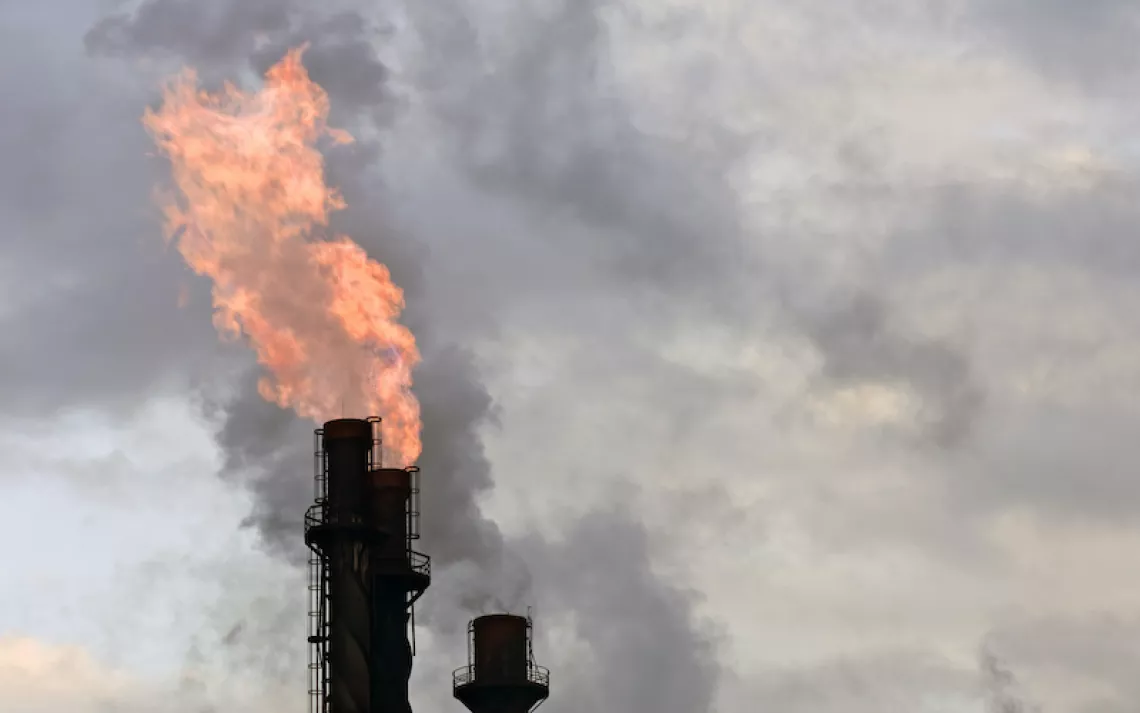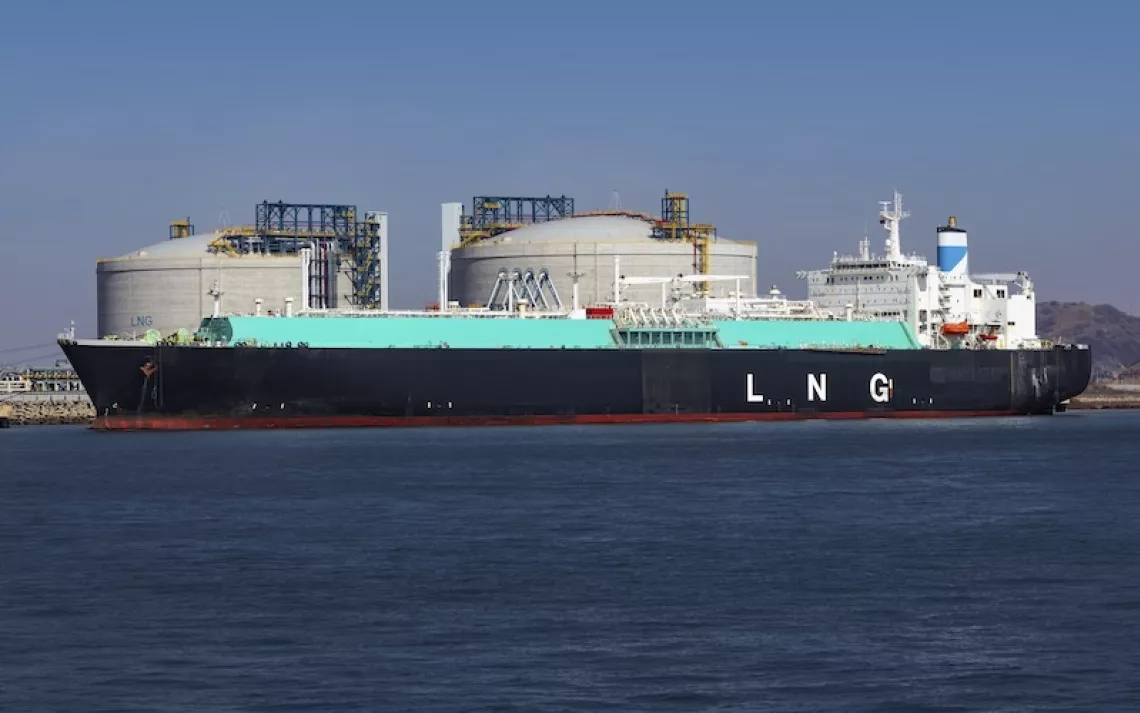Climate Activists Rack Up Another Victory Over Gas Industry
Contested Jordan Cove export terminal in Oregon put on hold

Photo by Alex Milan / Sipa USA via AP Images
Jordan Cove, the controversial pipeline and liquefied natural gas (LNG) export facility proposed for southwest Oregon, is dead—again. Probably. For now.
The Canadian fossil fuel infrastructure company Pembina, which owns Jordan Cove, made the announcement as an aside in a routine press release about its quarterly profits. The company said it “recognized an impairment in its investment in Jordan Cove and is evaluating the path forward.” Pembina went on to say that it still believes in the “strategic rationale” of the project and that the time for Jordan Cove may come. “However, we can sadly no longer predict with certainty when that time will be.”
The project—which would have included a new 229-mile pipeline and liquefaction facility in Coos Bay, Oregon—received approval from the Federal Energy Regulatory Commission (FERC) in March 2020. But the company was unable to begin construction on the project since it still lacked several state permits. On January 19, FERC upheld the State of Oregon’s denial of the project’s 401 water quality certificate, required by Section 401 of the Clean Water Act. And in early May, the Oregon State Land Use Board of Appeals reversed two local permits that would have allowed the extensive dredging needed for the project.
Many see Pembina’s announcement—that it’s hitting pause—as the equivalent of a white flag.
“There’s no hope for Jordan Cove LNG, and it’s time for Pembina to give up and cancel this project outright,” said Ashley Audycki, Coos County Field Organizer with Rogue Climate, in a press release after Oregon officials denied the latest permit applications.
For the tribal members, local landowners, and environmental activists who have been fighting Jordan Cove for over 15 years, it’s a victory tinged with wariness.
“The threat to us is [the company] still has a certificate that grants them the power of eminent demand,” says Deb Evans, an Oregon landowner who refused to sell an easement on her property for the pipeline. “Even with no pipe in the ground, it’s still affecting what we can and can’t do.”
The likely (if not completely certain) demise of the Jordan Cove project is just the latest setback for the gas industry. Last July, Duke and Dominion Energy canceled the Atlantic Coast Pipeline, which would have moved fracked gas from Appalachia to the Southeast. Construction of the Mountain Valley Pipeline is currently stalled while the state of Virginia evaluates hundreds of water crossings. A cluster of LNG export terminals in Texas, including the Annova LNG facility, have also been put on hold in the face of extraordinary grassroots opposition and souring market conditions.
Rebekah Hinojosa, Gulf Coast campaign representative for the Sierra Club’s Beyond Dirty Fuels campaign, says sustained community action played an important role in the cancellation of Annova LNG, proposed for the Port of Brownsville in South Texas. The project received FERC approval in 2019, but owner Exelon canceled it in March, citing “changes in the LNG market.”
“We’ve been using every tactic we can,” says Hinojosa. In addition to lawsuits, the Sierra Club and other groups in the Stop the Money Pipeline coalition have been urging banks to stop financing fossil fuel projects while working to persuade overseas customers to resist purchasing fracked gas from the United States. French utility Engie and the Port of Cork in Ireland both have backed out of contracts to purchase gas from Rio Grande LNG.
Climate action advocates have also been pushing federal regulators to hear from community members affected by such projects. “FERC has a terrible track record on public outreach,” says Hinojosa, who described attending a FERC hearing as similar to “going on trial.” Individuals testify privately before stenographers rather than speaking in a public forum where community members can learn from each other. In addition, none of FERC’s materials are available in languages other than English, even though many residents of impacted Gulf Coast communities only speak Spanish.
Jordan Cove opponent Evans and her husband, Ron Schaaf, have experienced the challenges of the FERC process directly. This spring, the couple took part in one of several virtual “listening sessions” held by FERC to gather input from landowners, tribes, environmental groups, and energy consumers on the creation of the long-overdue Office of Public Participation (OPP). Congress authorized FERC to create this office in 1978, but it never happened. Several groups, spearheaded by Public Citizen, have been pushing FERC to act on the directive.
Many local landowners and activists say that the outcome on these projects is predetermined, and that for the Office of Public Participation to mean anything, it must happen in tandem with FERC policy reform. For example, FERC currently evaluates pipeline certificates using precedent agreements—private contracts between a pipeline company and prospective shipper—as proof of “public need.” Such narrow criteria fails to consider other factors, including market forces that determine whether the project is even viable.
Jordan Cove is a case in point. The project likely would have sourced most if not all of its gas from Canada, and all of it would have been exported overseas. In addition, the precedent agreements Jordan Cove secured were with Pacific Connector—the very pipeline that was to be built as part of the project.
For Evans, the use of eminent domain for such a project would have set a dangerous precedent. “It should be questioned whether export projects [even] meet the definition of public interest as defined in the Natural Gas Act,” she says. “If [the creation of] jobs and revenue is the driver, not public need to have the product, it’s a slippery slope.”
Evans and others say the creation of the Office of Public Participation is one way to address such concerns. “It’s a huge step in the right direction—if they do it correctly,” says Megan Gibson, senior staff attorney for the Niskanen Center, which represents landowners in pipeline challenges across the country. During one of the listening sessions—the first such sessions ever held by FERC—landowners presented a catalog of abuses: FERC doesn’t require pipeline companies to return easements to landowners if projects are canceled; FERC delegates the task of notifying landowners to pipeline companies; FERC doesn’t protect landowners from eminent domain while appeals are pending.
On April 16, Evans and Schaaf served on a panel during a FERC-held workshop on the Office of Public Participation—the only landowner representatives invited. They filled their testimony time with a list of specific asks: a more comprehensible and accessible process that allows everyone, including rural landowners with no internet, to participate; a hotline where landowners can anonymously report abuses; and the creation of an Intervenors Compensation fund.
“It doesn’t take a genius to understand that money, or lack thereof, is what keeps landowners out of court,” Evans adds. “If we don’t have money, we can’t access due process.”
Gibson, who also participated in the workshop, says a compensation fund is vital for leveling the playing field. As part of her written comments, she put together a sample budget for a hypothetical pipeline project that would enable landowners to hire experts and pay for representation.
Though Gibson and Evans are hopeful that this process will result in meaningful change, they and other workshop participants expressed concern that all of this is just “window dressing.”
“The OPP is a good step in the right direction, but we need a lot more,” says Hinojosa, who is still fighting two other FERC-approved projects that have yet to begin construction. “All of our communities in the Rio Grande Valley have spoken up that we don’t want these terminals, yet FERC has authorized them anyway.”
Climate activists and others who oppose these projects have reason to be wary. A congressional investigation of FERC headed by Representative Jamie Raskin, a Maryland Democrat, revealed a process that grossly favors fossil fuel companies. In the past 20 years, FERC has granted over 1,000 certificates while denying only six, two of which were previous iterations of Jordan Cove.
In addition to the formation of the Office of Public Participation, there are other signs the agency is trying to balance its approach. Just this month, FERC published an updated order (No. 871), which partially remedies an issue faced by many landowners who challenge pipeline projects: the way in which pipeline companies can proceed with construction and land-taking through eminent domain while affected landowners are stuck in legal limbo and unable to get their day in court. The new order clarifies that FERC has the discretion to “stay,” or pause, a certificate for up to 150 days after it is issued.
“Before this order, a company could immediately go to court and start taking land through eminent domain,” Gibson says. “This potentially prevents companies from going to court and filing condemnation actions for that entire 150-day period. It’s an extraordinary shift in policy.”
In another surprising move, FERC has also asked the developers of the Atlantic Coast Pipeline what they plan to do with the hundreds of miles of easements it secured for its defunct pipeline project. The appointment of Richard Glick as FERC chairman and Allison Clements as commissioner have shifted the atmosphere at the agency, which appears to be newly emphasizing environmental justice and the climate impacts of fossil fuel infrastructure projects. That FERC is taking ownership of its authority to make decisions that protect landowners and communities is a good sign, says Gibson, but she adds that there should also be a mechanism that allows projects like Jordan Cove to be denied with prejudice. “The fact that people have been fighting this project for over 15 years is absolutely insane,” she says. “This should not be happening in the United States of America.”
This article has been updated since publication.
 The Magazine of The Sierra Club
The Magazine of The Sierra Club



